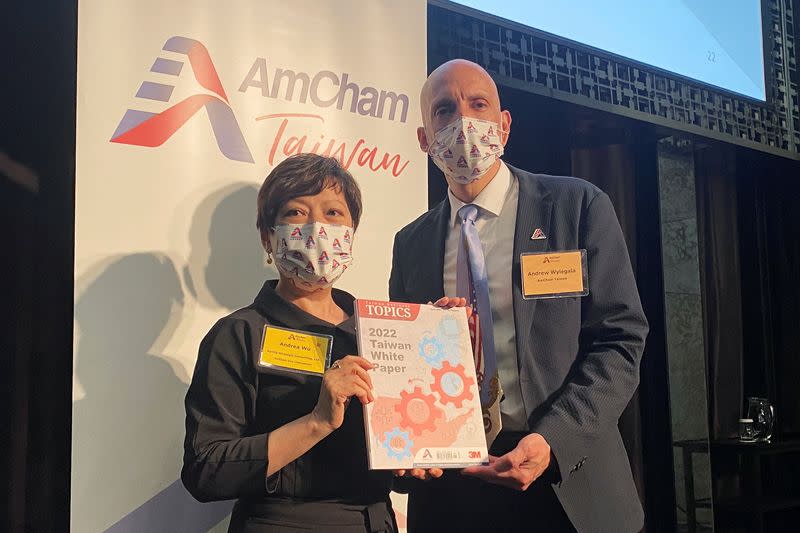Rising tension between the US and China has dented the confidence of US companies in Taiwan, a new survey has revealed.
Nearly half of companies surveyed by the American Chamber of Commerce (AmCham) in Taiwan are reviewing or plan to review their business continuity plans. And many have said they have been affected by geopolitical tensions.
China, which views democratically-governed Taiwan as its own territory, has been stepping up military drills across the Taiwan Strait since then-US House Speaker Nancy Pelosi visited Taipei in August.
In a survey released on Tuesday, which was done between November 15 and December 16, AmCham Taiwan said 33% of respondents said their operations had been “significantly disrupted” by the increase in tensions, compared with 17% when it did a flash survey in August right after China began war games.
While what it described as “personal anxiety” about increased military activity or tensions remained flat between August and December, some 47% of companies said they have either revised or plan to revise business continuity plans “to address the new geopolitical climate.”
“We are aware that companies are either initiating or renewing their planning efforts, operational contingency planning. We know that’s going on,” AmCham Taiwan President Andrew Wylegala told reporters.
ALSO SEE:
New US House Speaker McCarthy Expected to Visit Taiwan
Elevated concern deferring investment
AmCham Taiwan, which said that 214 of its 437 members responded to the December survey, said one-third of companies reported being disrupted by elevated concern or policy changes from their global headquarters, followed by increased shipping, insurance, or financial costs and staff anxiety.
Political uncertainty was the biggest factor deferring members from further investment in Taiwan, and more than half of respondents said cross-strait relations should be the government’s top priority in the coming three years, it said.
The group has called for an ambitious agenda to accelerate economic cooperation with Taiwan through a new Taiwan-US trade talks framework – and eventually a bilateral trade agreement, though it hopes to see faster progress.
“Engagements are going on between the US and Taiwan. A year and half ago there was none,” Wylegala said. “There is an expectation and hope that things will move faster.”
KMT visit to Beijing
Meanwhile, a senior leader of the Kuomintang (KMT), Taiwan’s main opposition party, will visit China this week and meet its top Taiwan policy-maker, the party said on Monday, amid continued military and political tensions between the two sides.
China has during the past three years ramped up pressure on Taiwan to accept Chinese sovereignty, including staging regular military drills near the democratically governed island. Taiwan’s government rejects China’s territorial claims.
The KMT said its deputy chairman, Andrew Hsia, would leave for China on Wednesday and meet Song Tao, the newly appointed head of China’s Taiwan Affairs Office, in a rare high-level interaction between top politicians from Taiwan and China.
Hsia, a former Taiwanese diplomat and one-time head of Taiwan’s Mainland Affairs Council, and his delegation will “conduct exchanges and dialogue on the basis of equality and dignity”, the KMT said.
They will “reflect Taiwan’s latest public concerns about the security of the Taiwan Strait and expectations for regional peace and stability”, the party added.
The Mainland Affairs Council said the KMT had informed it of the trip, adding that Taiwanese politicians who visit China should “reflect” the Taiwan people’s insistence on maintaining democracy and peace and not enter into any authorised negotiations.
The KMT traditionally favours close ties with China, but strongly denies being pro-Beijing. China’s Taiwan Affairs Office said it welcomed Hsia’s visit.
Hsia visited China last August, on a trip condemned by Taiwan’s government, shortly after Beijing staged war games near Taiwan to express anger at Pelosi’s visit to Taipei.
China has not spoken with Taiwan President Tsai Ing-wen’s administration since she took office in 2016, believing she is a separatist, and has rebuffed frequent calls from Tsai for dialogue to resume.
The KMT has defended its outreach to China, saying lines of communication must be kept open.
The party’s statement on Hsia’s visit said that considering the current “stalemate” in relations across the Taiwan Strait, “it is natural not to sit idly by” and that the KMT would report on the trip to the government once back.
- Reuters with additional editing by Jim Pollard and Alfie Habershon
ALSO SEE:
Taiwan’s TSMC Starts Production of Its Most Advanced Chip Yet
China Ditched Tacit Agreement on Taiwan Strait: Minister
Chinese Planes, Ships Simulating Attacks, Taiwan Says
China Hits Taiwan With Economic Sanctions as Pelosi Visits
TSMC Shuts if China Invades Taiwan, Says Boss – Focus Taiwan
























